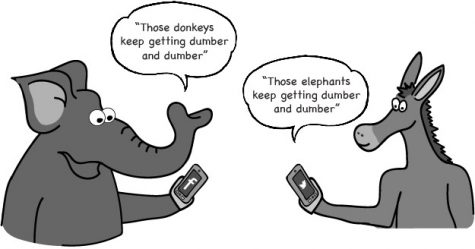The age of Faboocrats and Twittertarians
How social media influences politics

Lauren Wojcuich said Americans are “ridiculously embarrassed to be wrong.”
The senior communication studies major said American politics have become a hard divide between Republicans and Democrats.
“Instead of thinking about each issue and developing an opinion on it they think, ‘okay what do the other Democrats think? I need to make sure I’m on their side so that I’m still on the right team’ and then the Republicans are the same way,” Wojcuich said. “And what people don’t realize is that if they actually thought about issues, they probably would have a lot more views on both sides than they think.”
According to a new Pew Research Center study, there is little overlap in the news sources Republicans and Democrats turn to and trust. And whether discussing politics online or with friends, they are more likely than others to interact with like-minded individuals.
The survey found that staunch conservatives, when on Facebook, are more likely than those in other ideological groups to hear political opinions that are in line with their own views.
The survey also found that staunch liberals are more likely than those in other ideological groups to block or “defriend” someone on a social network – as well as to end a personal friendship – because of politics.
“A lot of people are quick to say, ‘if you think this then unfriend me,’ ‘unfollow me,’ or ‘we can’t be friends,’” Wojcuich said. “I think it’s important to realize that everyone has a way to justify what they think, and if you ask them they will either justify it for you, or they will realize that they can’t justify it, and then maybe question their own view, which is something I have done a lot since I have been at college.”
Wojcuich said she stays away from traditional news media because she feels deceived when she feels like someone is trying to convince her to agree with them.
“I like to watch Philip DeFranco videos on YouTube,” Wojcuich said. “I think he’s a smart dude and I trust him. I feel like he gives both viewpoints on an issue, and explains the pros and cons of both sides. He doesn’t tell you what his side is, but he just basically tells you to just be a good person.”
Wojcuich said it’s important to surround yourself with people who you disagree with, especially on social media.
“If you never talk to people who disagree with you, you’re never going to grow, you’re never going to learn more things and you are always going to be stuck in the way that you currently think,” Wojcuich said. “I think you need to surround yourself with people who think differently than you so that you can learn from them, or learn better ways to either improve your own argument, or to realize you might have been wrong about something you thought. You’ll never know that if you never hear something that goes against it.”
John Dwyer said he often disagrees with the things he sees pop up on his Facebook timeline.
The junior English and Spanish major said he doesn’t fall strictly into one political party or the other, and actively works against simply being concretized in his current ideas.
“I don’t know if anyone else uses this term, but a few years ago among some of my friends I started to use the term ‘ideological inbreeding’ where if you just repeat the same ideas over and over again you end up with really deficient and ineffective views,” Dwyer said. “I think that is what happens when you only talk to people who you agree with, that it just concretizes you to dogma rather than rational thinking.”
Dwyer said he follows PBS News, NPR and BBC because he feels those sources attempt to reduce their bias as much as they can.
“I think that it is a very dangerous thing that we’re just being fed information or even entertainment that already coincides with our personal tastes and already established ideas,” Dwyer said. “If we’re not being challenged, then we’re not growing, and I think that is a very grave problem posing our society.”
Dwyer said he doesn’t think the polarization we see today is any different than the polarization we have always seen.
“The poet Yeats talks about the ever-expanding differences between the right and the left,” Dwyer said. “You think of WWII Germany and how far right the right went. Again and again, throughout history, you see all these examples of extreme polarization. I don’t know if we are facing anything new today. I think we are facing the same old demons that we always had as a people. I just think it looks a little different because it’s clothed in new technology.”
Dwyer said he feels like the solution is education.
“All you can do every generation is continue to offer those facts. Make those facts available. Make our education system such that that information is available to everyone, and not just to some elite or not to those who would just twist those facts,” Dwyer said. “I think if we keep making that information known, I hope and I trust that humanity will tend toward equity and justice rather than dogma and polarization.”


